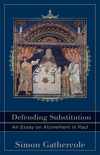
Overview
In recent decades, the church and academy have witnessed intense debates concerning the concept of penal substitution to describe Christ's atoning sacrifice. Some claim it promotes violence, glorifies suffering and death, and amounts to divine child abuse. Others argue it plays a pivotal role in classical Christian doctrine. Here world-renowned New Testament scholar Simon Gathercole offers an exegetical and historical defense of the traditional substitutionary view of the atonement. He provides critical analyses of various interpretations of the atonement and places New Testament teaching in its Old Testament and Greco-Roman contexts, demonstrating that the interpretation of atonement in the Pauline corpus must include substitution.
Table of Contents
Introduction
The Importance of Substitution
Defining Substitution: Christ in Our Place
Criticisms of Substitution
1. Exegetical Challenges to Substitution
The Tübingen Understanding of Representative "Place-Taking"
Interchange in Christ
Apocalyptic Deliverance
The Omission or Downplaying of "Sins"
Conclusion
2. "Christ Died for Our Sins according to the Scriptures" (1 Cor. 15:3)
The Importance of 1 Corinthians 15:3-4
"According to the Scriptures"
Substitution in 1 Corinthians 15:3
Conclusion
Excursus: An Objection--Why, Then, Do Christians Still Die?
3. The Vicarious Death of Christ and Classical Parallels (Rom. 5:6-8)
The Translation of Romans 5:6-8
A Sketch of the Exegesis
Vicarious Deaths in Classical Tradition
The Comparison in Romans 5:6-8
Conclusion
Conclusion
Indexes
The Importance of Substitution
Defining Substitution: Christ in Our Place
Criticisms of Substitution
1. Exegetical Challenges to Substitution
The Tübingen Understanding of Representative "Place-Taking"
Interchange in Christ
Apocalyptic Deliverance
The Omission or Downplaying of "Sins"
Conclusion
2. "Christ Died for Our Sins according to the Scriptures" (1 Cor. 15:3)
The Importance of 1 Corinthians 15:3-4
"According to the Scriptures"
Substitution in 1 Corinthians 15:3
Conclusion
Excursus: An Objection--Why, Then, Do Christians Still Die?
3. The Vicarious Death of Christ and Classical Parallels (Rom. 5:6-8)
The Translation of Romans 5:6-8
A Sketch of the Exegesis
Vicarious Deaths in Classical Tradition
The Comparison in Romans 5:6-8
Conclusion
Conclusion
Indexes
Endorsements
"The meaning of Jesus's death remains controversial. In this short exploratory study Simon Gathercole draws on a range of classical as well as biblical sources to argue that for Paul, at least, the notion of substitution remained central. Many questions remain, but this book will give new energy to the ongoing discussion."
N. T. Wright, Research Professor of New Testament and Early Christianity, University of St. Andrews, Scotland
"Why is Good Friday good? According to one classic answer to this question, Jesus's shameful and violent death belongs to the good news of the gospel because he died in our place. By careful and lucid analysis of key passages, Simon Gathercole shows that this view has deep roots both in Paul's texts and in his Jewish and Greco-Roman cultural heritage. Often criticized and caricatured, the concept of substitution is integral to the New Testament's conviction that Christ died 'for us' and 'for our sins.'"
Francis Watson, research chair in biblical interpretation, Durham University
"Can Christ's work of atonement be substitutionary in nature? Though Reformation Protestantism has replied in the affirmative, much recent scholarship has tended to have a negative view of this atonement motif. Simon Gathercole is to be congratulated for intervening in this debate with a short, clear, and lively book that argues the case for a substitutionary motif from a biblical perspective, and with an eye to both the Christian tradition and recent debates in the literature. This is a work all those interested in the atonement will want to read and engage. It is certainly a book I shall be recommending to my students."
Oliver D. Crisp, Fuller Theological Seminary
"In this little book, Simon Gathercole carefully and convincingly dismisses false dichotomies. The death of Christ is presented in the Bible as both representative and substitutionary. These learned and lucid lectures use the prism of modern disputes to take us to the heart of Pauline teaching on the cross. I highly commend it."
Mark Dever, pastor, Capitol Hill Baptist Church, Washington, DC
"Addressing a hot topic in Pauline studies, Gathercole's Defending Substitution agrees with those who see Christ's death as one in which believers participate and as effecting apocalyptic deliverance. At the same time, he argues persuasively for the less-fashionable view that Paul also speaks of that death as substitutionary: Christ died in the place of others, and for their sins. A model of scholarly clarity and sobriety."
Stephen Westerholm, professor of early Christianity, McMaster University
"In this slender but admirably clear and focused volume, Simon Gathercole sets out to recover the recently unfashionable understanding of the atonement in classic Reformational terms of substitution. He concludes that there is indeed every reason to recognize this theme in key texts such as 1 Corinthians 15:3 and Romans 5:6, when they are understood in their Old Testament as well as Greco-Roman contexts. But this is for him a case of compatible rather than competing metaphors: Christ's substitution for sinners does not make his death any the less representative or liberating. I warmly recommend this revival of a classic argument that recent New Testament scholarship sometimes appears to have forgotten. Here is an eminently accessible point of reference for future exegetical, theological, and, indeed, ecumenical engagement with St. Paul on the death of Christ."
Markus Bockmuehl, Keble College, Oxford
Author
Simon Gathercole
Simon Gathercole (PhD, University of Durham) is senior lecturer in New Testament studies in the Faculty of Divinity of the University of Cambridge and Fellow and director of studies in theology at Fitzwilliam College, Cambridge. A leading British New Testament scholar, he has written hundreds of articles and several groundbreaking volumes, including The Preexistent Son: Recovering the Christologies of Matthew, Mark, and Luke; The Gospel of Judas: Rewriting Early Christianity; The Composition of the Gospel of Thomas; and The Gospel of Thomas: Introduction and Commentary. He is also coauthor of How God Became Jesus: The Real Origins of Belief in Jesus' Divine Nature--A Response.